#BEST ARTICLES
Text
My paper featured in the 50 best microbiology papers!
Our discovery of a new antibiotic target in bacteria was selected by a Nature Communications editor as one of the 50 best recently published papers in Microbiology and infectious diseases.
Search for "Lateral membrane organization" among the featured articles to find the research that I coordinated:
This surely gives me a boost for my next scientific work! Although it took ages to publish it (4 years this one) and A LOT of frustration, it was worth it!
#science#research#postdoc#women in science#biophysics#microbiology#infectious diseases#bacteria#antibiotic#antimicrobial resistance#featured#top 50#best articles#boost#original content
19 notes
·
View notes
Text
the fact that shakespeare was a playwright is sometimes so funny to me. just the concept of the "greatest writer of the English language" being a random 450-year-old entertainer, a 16th cent pop cultural sensation (thanks in large part to puns & dirty jokes & verbiage & a long-running appeal to commoners). and his work was made to be watched not read, but in the classroom teachers just hand us his scripts and say "that's literature"
just...imagine it's 2450 A.D. and English Lit students are regularly going into 100k debt writing postdoc theses on The Simpsons screenplays. the original animation hasn't even been preserved, it's literally just scripts and the occasional SDH subtitles.txt. they've been republished more times than the Bible
#due to the Great Data Decay academics write viciously argumentative articles on which episodes aired in what order#at conferences professors have known to engage in physically violent altercations whilst debating the air date number of household viewers#90% of the couch gags have been lost and there is a billion dollar trade in counterfeit “lost copies”#serious note: i'll be honest i always assumed it was english imperialism that made shakespeare so inescapable in the 19th/20th cent#like his writing should have become obscure at the same level of his contemporaries#but british imperialists needed an ENGLISH LANGUAGE (and BRITISH) writer to venerate#and shakespeare wrote so many damn things that there was a humongous body of work just sitting there waiting to be culturally exploited...#i know it didn't happen like this but i imagine a English Parliament House Committee Member For The Education Of The Masses or something#cartoonishly stumbling over a dusty cobwebbed crate labelled the Complete Works of Shakespeare#and going 'Eureka! this shall make excellent propoganda for fabricating a national identity in a time of great social unrest.#it will be a cornerstone of our elitist educational institutions for centuries to come! long live our decaying empire!'#'what good fortune that this used to be accessible and entertaining to mainstream illiterate audience members...#..but now we can strip that away and make it a difficult & alienating foundation of a Classical Education! just like the latin language :)'#anyway maybe there's no such thing as the 'greatest writer of x language' in ANY language?#maybe there are just different styles and yes levels of expertise and skill but also a high degree of subjectivity#and variance in the way that we as individuals and members of different cultures/time periods experience any work of media#and that's okay! and should be acknowledged!!! and allow us to give ourselves permission to broaden our horizons#and explore the stories of marginalized/underappreciated creators#instead of worshiping the List of Top 10 Best (aka Most Famous) Whatevers Of All Time/A Certain Time Period#anyways things are famous for a reason and that reason has little to do with innate “value”#and much more to do with how it plays into the interests of powerful institutions motivated to influence our shared cultural narratives#so i'm not saying 'stop teaching shakespeare'. but like...maybe classrooms should stop using it as busy work that (by accident or designs)#happens to alienate a large number of students who could otherwise be engaging critically with works that feel more relevant to their world#(by merit of not being 4 centuries old or lacking necessary historical context or requiring untaught translation skills)#and yeah...MAYBE our educational institutions could spend less time/money on shakespeare critical analysis and more on...#...any of thousands of underfunded areas of literary research i literally (pun!) don't know where to begin#oh and p.s. the modern publishing world is in shambles and it would be neat if schoolwork could include modern works?#beautiful complicated socially relevant works of literature are published every year. it's not just the 'classics' that have value#and actually modern publications are probably an easier way for students to learn the basics. since lesson plans don't have to include the#important historical/cultural context many teens need for 20+ year old media (which is older than their entire lived experience fyi)
23K notes
·
View notes
Text
The Most Popular WTTN Articles of 2023
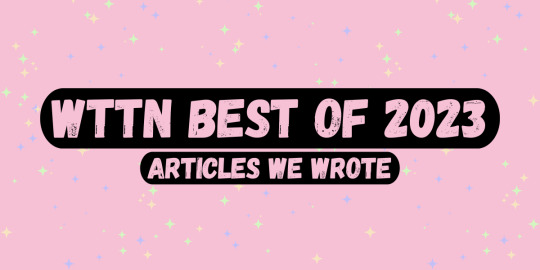
View On WordPress
#best articles#best of#best of 2023#by Jocelyn#most popular articles#most viewed post#most viewed posts#wttn best of#wttn best of 2023
0 notes
Text
The Top 10 No-Fault Collections Myths Debunked
As a collections agency, we understand that collections can be a tricky and sometimes confusing business. With so many myths and misconceptions floating around, it can be hard to know what is true and what isn't. That's why we've put together this article to debunk the top 10 no-fault collections myths that we hear most often.

Myth: Collecting debt is illegal
Truth: Collecting debt is not illegal. In fact, it is a necessary part of doing business. However, there are laws and regulations that govern the collection of debt, and collectors must abide by these laws.
Myth: Collectors can do whatever they want to collect a debt
Truth: Collectors must follow strict guidelines set forth by the Fair Debt Collection Practices Act (FDCPA). These guidelines prohibit certain actions, such as harassment, threats, and deception, and require collectors to provide certain information to debtors.
Myth: If a debtor refuses to pay, there's nothing a collector can do
Truth: While collectors may not be able to force a debtor to pay, there are several legal avenues that can be pursued to collect a debt, including wage garnishment and liens on property.
Myth: Debtors can't dispute a debt
Truth: Debtors have the right to dispute a debt, and collectors are required to investigate any disputes. If a debt is found to be invalid or inaccurate, the collector must stop collection efforts.
Myth: Collectors can only contact debtors during certain hours
Truth: Collectors may contact debtors at any time, as long as the contact is not made at an unreasonable time or place or with the intent to harass or intimidate the debtor.
Myth: Debtors can't negotiate a payment plan
Truth: Debtors have the right to negotiate a payment plan with a collector, and collectors are often willing to work with debtors to find a solution that works for both parties.
Myth: Once a debt is paid, it will be removed from a credit report
Truth: While paying off a debt can improve a credit score, the debt will remain on a credit report for seven years from the date of delinquency.
Myth: Collectors can't contact a debtor's employer
Truth: Collectors may contact a debtor's employer to verify employment or to garnish wages, but they may not disclose that the debtor owes a debt.
Myth: Debtors can ignore collection letters and phone calls
Truth: Ignoring collection letters and phone calls will not make a debt go away. In fact, ignoring collection efforts may result in legal action being taken against the debtor.
Myth: Collections agencies are only interested in collecting money
Truth: While collections agencies are in the business of collecting debts, they are also interested in maintaining positive relationships with debtors. Many agencies offer credit counseling and other resources to help debtors manage their finances.
In conclusion, these are just a few of the many myths that surround the collections industry. While there are certainly bad actors in the industry, the vast majority of collections agencies operate within the bounds of the law and strive to treat debtors with respect and fairness. If you are a debtor, it's important to know your rights and to work with collectors to find a solution that works for both parties.
0 notes
Text
my first reading in my African history class this year is about why using “tribe” to refer to ethnic groups stems from a racist desire to make African conflicts sound primitive or stemming from a desire to pretend that these are just ancient conflicts that have always existed. great article and I also feel like I’m vicariously experiencing the bullshittery that this author has been subjected to from people they’ve tried to talk to about this. like the article remains extremely professional but you can just hear in the tone that they’re talking through gritted teeth, you can practically see the customer service smile

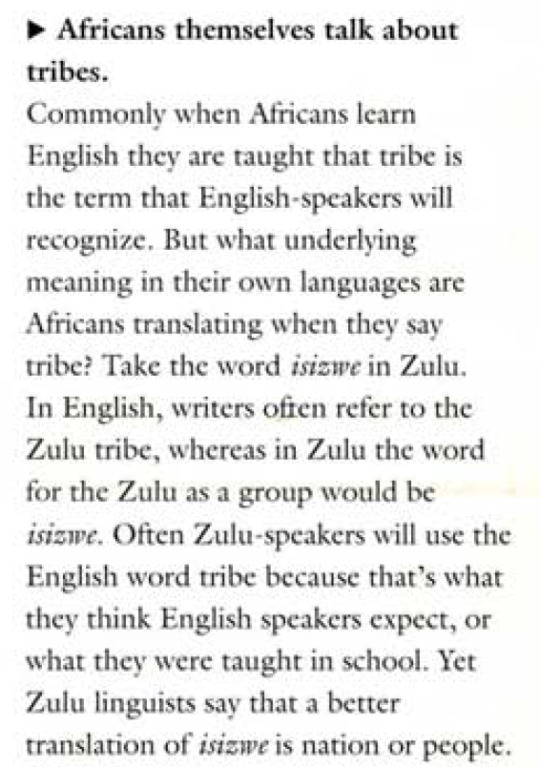
[ID: a screenshot from a section of the article titled “But why not use ‘tribe’? Answers to common arguments.” Under the bullet point for the argument “Africans talk about themselves in terms of tribes” is written, “Commonly when Africans learn English they are taught that tribe is the term that English-speakers will recognize. But what underlying meaning in their own languages are Africans translating when they say tribe? Take the word isizwe in Zulu. In English, writers often refer to the Zulu tribe, whereas in Zulu the word for the Zulu as a group would be isizwe. Often Zulu-speakers will use the English word tribe because that's what they think English speakers expect, or what they were taught in school. Yet Zulu linguists say that a better translation of isizwe is nation or people.” /end ID]
translation: “ ‘Oh ho ho but some Africans themselves say tribe!’ You dipshit. You fucking donkey. When someone has a word that means “nation” or “people” in their own language but then when they learn English YOU TELL THEM IT TRANSLATES TO “TRIBE” then THAT WILL BE THE WORD THEY USE. Maybe if you LISTENED TO THE LINGUISTS OF THAT GROUP you’d have more accurate information. Asshole.”
each point is repeated over and over with like five different examples because you just know there are dipshits out there who will keep arguing.
to the anonymous author of this article for the Africa Policy Information Center I hope you have a good day every day and experience fewer people being assholes about this, your patience is actually legendary
#idk if this is the best example from the article but throughout it you can just hear the pained patience#you just know people have been Like That#i just wanna bring this author a warm cup of their favorite beverage#an e original
40K notes
·
View notes
Text
i think a lot about the time someone uploaded a picture of their cat to the scp wiki as a joke article and the actual funniest part of the joke was how it became the most controversial thing on the wiki for a week

#scp#scp wiki#scp foundation#scp-pl-kot-j#the best part was that it was a “translation” of an article on the polish branch of the wiki which was the exact same thing
2K notes
·
View notes
Text
100th Post Celebration And Your Favourite Posts Of All Time
We have finally reached a huge milestone with this website: our 100th post! Here's a list of your favourite articles!
We have finally reached a huge milestone with this website and it is this 100th post! I have to admit at times researching and writing have not been the easiest things to do, but looking back now all of them were worth the effort.
Seeing all of you coming here and finding value in what has been written, is truly the only prize I need.
I wanted to look back on these 100 posts and the ones I…

View On WordPress
0 notes
Text
has everyone seen that clip of limmy getting sidetracked on a stream over checking how john linnell looks these days from about a year ago btw
"do you think he's bald, by the way? I mean, that's 1990 - look at the forehead. say if I just checked him out, and his hair's all shaved off, we could say "aye, bald". you know, something like that. but I've got a feeling he might be clinging onto it, and we're gonna have a debate, about if that... is baldness. ... oh you FUCKIN bastard. WHAT. wait, wait, wait, wait. wait. WHAA T. that's two-? NO WAYYY. hold on. he's- what age is he? ... SIXTY fuckin three??? [stammering] hold on.... GET tae FUCK.... not lost a ffffUCKIN- .... that the same guy?"
#this feels like it's edited even tho it isn't#I hope the grub street article picture never leaves the top search results. genuinely it's the best#tmbg#videos
442 notes
·
View notes
Text
I will say this once because I'm tired of seeing stupid discourse: anti-transmasculinity is not about being treated bad because we clock as men, it's about being treated as stupid little girls because transphobes think we've been tricked into this.
It's kind of the opposite of transmisogyny- instead of fear and revulsion, it's constant condescension, the implications that we've been whisked away from femininity by scary bad guys, that we're going to cause 'irreparable damage' because we don't know what's best for ourselves, somehow. People fearmonger a lot about the "ugliness" of transfem people, but for transmasc people that 'ugliness' is used as a warning- you'll look like THIS! You'll go BALD! Your top surgery scars will leave you MUTILATED! A lot of aesthetic concerns. Worry about our 'beauty'. Because it comes from that same stupid reactionary 'we gotta SAVE the WOMEN' shit, but this time they have to save them from getting 'stolen away', as if we're being seduced or pressured into this. As if we can't make our own decisions.
For TERFS specifically, they're losing one of their own. We're 'gender traitors', willingly aligning ourselves with the half of the population they consider unilaterally dangerous and evil.
We aren't REALLY trans, we just want the benefits that men get. You don't actually want to transition, you're just trying to avoid misogyny.
You aren't actually a man, you're just a self-loathing lesbian.
Why can't you just be a butch girl? Why can't you just be a tomboy?
Why can't you just be something that I don't think is icky?
Anyway. Like all things, it boils down to misogyny. Women stupid and gentle, dont know what best for them, evil men trick into taking man juice, must save because lady stupid and dont know what best for them (having babies and being Feminine).
Theres like. Obviously more to this but I'm just a Transmasc Rando explaining this from my perspective, and I'm not the best with words. Anyone is free to hop in and add on to this
#long post#transphobia#spitblaze says things#anti-transmasculinity#several disclaimers#i do not think misandry is real.#i think stigmatization of masculinity is real with a lot of women and terfs specifically#i think a lot of people whether they know it or not consider men to be inherently 'bad'#i think men are very often treated as emotionless and 'tough' by default which causes a lot of issues#but thats not anywhere near the level of misogyny. its a separate issue and not related#im not trying to say that trans men somehow have it 'worse' than trans women?? what would thay even accomplish. this isnt a pissing contest#and even if it was I'd lose#and my wording isnt the best bc this is a Midnight Rant and not a scholarly article#if you want to pick a fight about semantics consider that theres a good chance that i genuinely didnt realize what i said#anyway uh. yeah. this discourse is dumb i cant belive its happening#and i especially cant belive how bad people are at articulating the actual point of the matter#(not that im one to talk lmao)#doin numbers
2K notes
·
View notes
Text


According to an "interview" from an issue of Comptiq magazine, Tsukasa and Rui both agree that being in the same class for 3rd year would be useful since it would make it easier for them to plan shows for WonderlandsxShowtime. However, Tsukasa is worried that if this happens, the teacher will make him act as a chaperone for Rui. Rui likes that idea since it means Tsukasa will take partial responsibility for his actions.
#project sekai#tsukasa tenma#rui kamishiro#sorry about the quality this is the best i could find#it’s Q3 on both articles#edit: apparently this was from comptiq and not pash my bad
493 notes
·
View notes
Text
found the video that this post is a transcription of
#when i listened to the vid i was like OH WAIT#bc seeing it in text form i just assumed it was a article interview but no there’s vid :-3#the best mistake ever <3#i love them sooooooooo much#sorry if someone has already posted this i haven’t seen it posted here to be fair so yeah#fall out boy#patrick stump#joe trohman#pete wentz#andy hurley#fob#video#fave 4#my post
250 notes
·
View notes
Text

Well this absolutely sucks.
#vice is responsible for some of the funniest articles ive ever read and also some of the best reporting on far right dingdongs#im currently watching some more news' video about the internet killing journalism that literally came out 2 weeks ago#and its obviously only gonna get worse. unfortunately i reckon rolling stone might be the next to go. some of my fave writers went there#after other sites died but the EOC stepping down a few weeks ago doesnt bode well#anyway everyone go subscribe to the worker owned sites like defector discourse blog and 404 media!#because they're needed more than ever!#vice#vice news
164 notes
·
View notes
Text
after HOURS of organisation, i present to you, my google drive library
#i will continue to make masterposts for more clarity and becuz they give me immense satisfaction#but if you’d just like to have a look around !!! that’s it !!!#all good 2 rb :^)#and as always: i’m happy 2 use my jstor access and love of hunting for pdfs 2 help anyone#so if u (mutual or not) would like something specific or a masterpost on smth specific i’ll do my best to help out just lmk !!!#resources#articles
3K notes
·
View notes
Text
"A Ghanaian-English entrepreneur has designed an electric bike from the ground up that’s transforming short-range transportation in her home country, proving that problem-solving in Africa can be done in Africa, by Africans.
[Valerie Labi's] company, Wahu!, assembles each bike by hand, and they can travel up to 80 miles [128 kilometers] on a single charge. This means that a delivery rider for Glovo or Bolt can comfortably cover a whole day’s work without refueling.
Anyone who’s visited Accra, Ghana, in the dry season will remember the incredibly poor air quality. Poor roads mean that cars are stuck in second and third gears, and old cars traveling in second and third gears mean plenty of extra car exhaust.
Poor roads also mean exposed dirt, and exposed dirt means fine-grained dust. Combined with a lack of rain, the smog, dust, and car exhaust make the air in parts of the capital unfit for human health.
Wahu! bikes help alleviate all three of these problems, and despite her English nativity [Note: Super weird and unclear way to phrase it?] and education, the bikes were designed and manufactured in Spintex, Accra.
“By introducing electric bikes into Ghana’s transportation ecosystem, we’re not only providing a greener alternative but also offering speed and convenience,” Labi told The Mirror. “Our bikes are a testament to how service delivery can be seamlessly merged with environmental conservation.”
Valerie Labi is a true inspiration, and besides her transportation company, she got her start in the Ghanaian economy in sanitation. She holds a chieftaincy title as Gundugu Sabtanaa, given to her by the previous Chief of the Dagbon traditional area in the Northern Region of Ghana. She has three children, holds a double major in Economics and Sustainability from two separate universities, and has visited 59 countries.
Getting her start in Northern Ghana, she founded the social enterprise Sama Sama, a mobile toilet and sanitation company that now boasts 300,000 clients.
During her travels around the small, densely populated country, she also recognized that transportation was not only a problem, but offered real potential for eco-friendly solutions.
“It took us two years to effectively design a bike that we thought was fit for the African road, then we connected with Jumia and other delivery companies to get started,” she told The Mirror. “Currently, I have over 100 bikes in circulation and we give the bikes on a ‘work and pay’ basis directly to delivery riders.”
According to Labi, each driver pays about 300 Ghana cedis, or about $24.00, per week to use the bike, which can travel 24 miles per hour, and hold over 300 pounds of weight. The fat tires are supported by double-crown front/double-spring rear suspension.
The bikes are also guaranteed by the company’s proprietary anti-theft system of trackers. Only a single bike has been stolen, and it was quickly located and returned to the owner."
-via Good News Network, January 24, 2024
#ghana#africa#black excellence#black entrepreneurship#black girl magic#transportation#ebikes#bikes#delivery drivers#sustainability#air pollution#environment#good news#hope#btw want to say for the record that it is generally considered journalism best practice#to not use a person's name in the headline of an article unless they're already a public figure#partly for privacy reasons and partly because that way the title gives readers more info that they can usefully interpret#so not including her name in the article title isn't inherently a huge snub#though the fact that GNN forgot to include her name until like the 6th paragraph kind of is!#I looked into using the original article this is based on because of that but imho it wasn't as good#it was in interview format and the intro at the beginning had way less info on accra and the bikes/her company/her work
182 notes
·
View notes
Text
essential reading.
Opinion - There is a Jewish Hope for Palestinian Liberation. It Must Survive. - by Peter Beinart
And perhaps one day, when it finally becomes hideously clear that Hamas cannot free Palestinians by murdering children and Israel cannot subdue Gaza, even by razing it to the ground, those communities may become the germ of a mass movement for freedom that astonishes the world, as Black and white South Africans did decades ago. I’m confident I won’t live to see it. No gambler would stake a bet on it happening at all. But what’s the alternative, for those of us whose lives and histories are bound up with that small, ghastly, sacred place?
"In 1988, bombs exploded at restaurants, sporting events and arcades in South Africa. In response, the African National Congress, then in its 77th year of a struggle to overthrow white domination, did something remarkable: It accepted responsibility and pledged to prevent its fighters from conducting such operations in the future. Its logic was straightforward: Targeting civilians is wrong. “Our morality as revolutionaries,” the A.N.C. declared, “dictates that we respect the values underpinning the humane conduct of war.”
Historically, geographically and morally, the A.N.C. of 1988 is a universe away from the Hamas of 2023, so remote that its behavior may seem irrelevant to the horror that Hamas unleashed last weekend in southern Israel. But South Africa offers a counter-history, a glimpse into how ethical resistance works and how it can succeed. It offers not an instruction manual, but a place — in this season of agony and rage — to look for hope.
There was nothing inevitable about the A.N.C.’s policy, which, as Jeff Goodwin, a New York University sociologist, has documented, helped ensure that there was “so little terrorism in the anti-apartheid struggle.” So why didn’t the A.N.C. carry out the kind of gruesome massacres for which Hamas has become notorious? There’s no simple answer. But two factors are clear. First, the A.N.C.’s strategy for fighting apartheid was intimately linked to its vision of what should follow apartheid. It refused to terrify and traumatize white South Africans because it wasn’t trying to force them out. It was trying to win them over to a vision of a multiracial democracy.
ADVERTISEMENT
Second, the A.N.C. found it easier to maintain moral discipline — which required it to focus on popular, nonviolent resistance and use force only against military installations and industrial sites — because its strategy was showing signs of success. By 1988, when the A.N.C. expressed regret for killing civilians, more than 150 American universities had at least partially divested from companies doing business in South Africa, and the United States Congress had imposed sanctions on the apartheid regime. The result was a virtuous cycle: Ethical resistance elicited international support, and international support made ethical resistance easier to sustain.
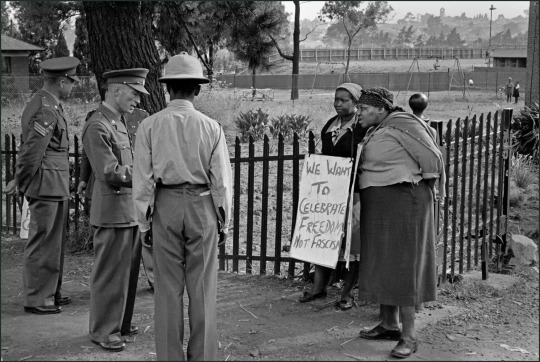
In Israel today, the dynamic is almost exactly the opposite. Hamas, whose authoritarian, theocratic ideology could not be farther from the A.N.C.’s, has committed an unspeakable horror that may damage the Palestinian cause for decades to come. Yet when Palestinians resist their oppression in ethical ways — by calling for boycotts, sanctions and the application of international law — the United States and its allies work to ensure that those efforts fail, which convinces many Palestinians that ethical resistance doesn’t work, which empowers Hamas.
The savagery Hamas committed on Oct. 7 has made reversing this monstrous cycle much harder. It could take a generation. It will require a shared commitment to ending Palestinian oppression in ways that respect the infinite value of every human life. It will require Palestinians to forcefully oppose attacks on Jewish civilians, and Jews to support Palestinians when they resist oppression in humane ways — even though Palestinians and Jews who take such steps will risk making themselves pariahs among their own people. It will require new forms of political community, in Israel-Palestine and around the world, built around a democratic vision powerful enough to transcend tribal divides. The effort may fail. It has failed before. The alternative is to descend, flags waving, into hell.
As Jewish Israelis bury their dead and recite psalms for their captured, few want to hear at this moment that millions of Palestinians lack basic human rights. Neither do many Jews abroad. I understand; this attack has awakened the deepest traumas of our badly scarred people. But the truth remains: The denial of Palestinian freedom sits at the heart of this conflict, which began long before Hamas’s creation in the late 1980s.
Most of Gaza’s residents aren’t from Gaza. They’re the descendants of refugees who were expelled, or fled in fear, during Israel’s war of independence in 1948. They live in what Human Rights Watch has called an “open-air prison,” penned in by an Israeli state that — with help from Egypt — rations everything that goes in and out, from tomatoes to the travel documents children need to get lifesaving medical care. From this overcrowded cage, which the United Nations in 2017 declared “unlivable” for many residents in part because it lacks electricity and clean water, many Palestinians in Gaza can see the land that their parents and grandparents called home, though most may never step foot in it.

Palestinians in the West Bank are only slightly better off. For more than half a century, they have lived without due process, free movement, citizenship or the ability to vote for the government that controls their lives. Defenseless against an Israeli government that includes ministers openly committed to ethnic cleansing, many are being driven from their homes in what Palestinians compare to the mass expulsions of 1948. Americans and Israeli Jews have the luxury of ignoring these harsh realities. Palestinians do not. Indeed, the commander of Hamas’s military wing cited attacks on Palestinians in the West Bank in justifying its barbarism last weekend.
Just as Black South Africans resisted apartheid, Palestinians resist a system that has earned the same designation from the world’s leading human rights organizations and Israel’s own. After last weekend, some critics may claim Palestinians are incapable of resisting in ethical ways. But that’s not true. In 1936, during the British mandate, Palestinians began what some consider the longest anticolonial general strike in history. In 1976, on what became known as Land Day, thousands of Palestinian citizens demonstrated against the Israeli government’s seizure of Palestinian property in Israel’s north. The first intifada against Israel’s occupation of the West Bank and the Gaza Strip, which lasted from roughly 1987 to 1993, consisted primarily of nonviolent boycotts of Israeli goods and a refusal to pay Israeli taxes. While some Palestinians threw stones and Molotov cocktails, armed attacks were rare, even in the face of an Israeli crackdown that took more than 1,000 Palestinian lives. In 2005, 173 Palestinian civil society organizations asked “people of conscience all over the world to impose broad boycotts and implement divestment initiatives against Israel similar to those applied to South Africa in the apartheid era.”
But in the United States, Palestinians received little credit for trying to follow Black South Africans’ largely nonviolent path. Instead, the Boycott, Divestment and Sanctions movement’s call for full equality, including the right of Palestinian refugees to return home, was widely deemed antisemitic because it conflicts with the idea of a state that favors Jews.
It is true that these nonviolent efforts sit uncomfortably alongside an ugly history of civilian massacres: the murder of 67 Jews in Hebron in 1929 by local Palestinians after Haj Amin al-Husseini, the grand mufti of Jerusalem, claimed Jews were about to seize Al Aqsa Mosque; the airplane hijackings of the late 1960s and 1970s carried out primarily by the leftist Popular Front for the Liberation of Palestine and Yasir Arafat’s nationalist Fatah faction; the 1972 assassination of Israeli athletes in Munich carried out by the Palestinian organization Black September; and the suicide bombings of the 1990s and 2000s conducted by Hamas, Palestinian Islamic Jihad and Fatah’s Aqsa Martyrs Brigades, whose victims included a friend of mine in rabbinical school who I dreamed might one day officiate my wedding.
And yet it is essential to remember that some Palestinians courageously condemned this inhuman violence. In 1979, Edward Said, the famed literary critic, declared himself “horrified at the hijacking of planes, the suicidal missions, the assassinations, the bombing of schools and hotels.” Rashid Khalidi, a Palestinian American historian, called the suicide bombings of the second intifada “a war crime.” After Hamas’s attack last weekend, a member of the Israeli parliament, Ayman Odeh, among the most prominent leaders of Israel’s Palestinian citizens, declared, “It is absolutely forbidden to accept any attacks on the innocent.”Tragically, this vision of ethical resistance is being repudiated by some pro-Palestinian activists in the United States. In a statement last week, National Students for Justice in Palestine, which represents more than 250 Palestinian solidarity groups in North America, called Hamas’s attack “a historic win for the Palestinian resistance” that proves that “total return and liberation to Palestine is near” and added, “from Rhodesia to South Africa to Algeria, no settler colony can hold out forever.” One of its posters featured a paraglider that some Hamas fighters used to enter Israel.
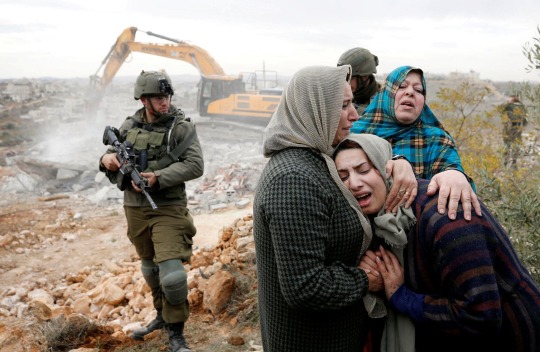
The reference to Algeria reveals the delusion underlying this celebration of abduction and murder. After eight years of hideous war, Algeria’s settlers returned to France. But there will be no Algerian solution in Israel-Palestine. Israel is too militarily powerful to be conquered. More fundamentally, Israeli Jews have no home country to which to return. They are already home.
Mr. Said understood this. “The Israeli Jew is there in the Middle East,” he advised Palestinians in 1974, “and we cannot, I might even say that we must not, pretend that he will not be there tomorrow, after the struggle is over.” The Jewish “attachment to the land,” he added, “is something we must face.” Because Mr. Said saw Israeli Jews as something other than mere colonizers, he understood the futility — as well as the immorality — of trying to terrorize them into flight.
The failure of Hamas and its American defenders to recognize that will make it much harder for Jews and Palestinians to resist together in ethical ways. Before last Saturday, it was possible, with some imagination, to envision a joint Palestinian-Jewish struggle for the mutual liberation of both peoples. There were glimmers in the protest movement against Benjamin Netanyahu’s judicial overhaul, through which more and more Israeli Jews grasped a connection between the denial of rights to Palestinians and the assault on their own. And there were signs in the United States, where almost 40 percent of American Jews under the age of 40 told the Jewish Electoral Institute in 2021 that they considered Israel an apartheid state. More Jews in the United States, and even Israel, were beginning to see Palestinian liberation as a form of Jewish liberation as well.
That potential alliance has now been gravely damaged. There are many Jews willing to join Palestinians in a movement to end apartheid, even if doing so alienates us from our communities, and in some cases, our families. But we will not lock arms with people who cheer the kidnapping or murder of a Jewish child.
The struggle to persuade Palestinian activists to repudiate Hamas’s crimes, affirm a vision of mutual coexistence and continue the spirit of Mr. Said and the A.N.C. will be waged inside the Palestinian camp. The role of non-Palestinians is different: to help create the conditions that allow ethical resistance to succeed.
Palestinians are not fundamentally different from other people facing oppression: When moral resistance doesn’t work, they try something else. In 1972, the Northern Ireland Civil Rights Association, which was modeled on the civil rights movement in the United States, organized a march to oppose imprisonment without trial. Although some organizations, most notably the Provisional Irish Republican Army, had already embraced armed resistance, they grew stronger after British soldiers shot 26 unarmed civilians in what became known as Bloody Sunday. By the early 1980s, the Irish Republican Army had even detonated a bomb outside Harrods, the department store in London. As Kirssa Cline Ryckman, a political scientist, observed in a 2019 paper on why certain movements turn violent, a lack of progress in peaceful protest “can encourage the use of violence by convincing demonstrators that nonviolence will fail to achieve meaningful concessions.”

Israel, with America’s help, has done exactly that. It has repeatedly undermined Palestinians who sought to end Israel’s occupation through negotiations or nonviolent pressure. As part of the 1993 Oslo Accords, the Palestine Liberation Organization renounced violence and began working with Israel — albeit imperfectly — to prevent attacks on Israelis, something that revolutionary groups like the A.N.C. and the Irish Republican Army never did while their people remained under oppression. At first, as Khalil Shikaki, a Palestinian political scientist, has detailed, Palestinians supported cooperation with Israel because they thought it would deliver them a state. In early 1996, Palestinian support for the Oslo process reached 80 percent while support for violence against Israelis dropped to 20 percent.
The 1996 election of Benjamin Netanyahu, and the failure of Israel and its American patron to stop settlement growth, however, curdled Palestinian sentiment. Many Jewish Israelis believe that Ehud Barak, who succeeded Mr. Netanyahu, offered Palestinians a generous deal in 2000. Most Palestinians, however, saw Mr. Barak’s offer as falling far short of a fully sovereign state along the 1967 lines. And their disillusionment with a peace process that allowed Israel to entrench its hold over the territory on which they hoped to build their new country ushered in the violence of the second intifada. In Mr. Shikaki’s words, “The loss of confidence in the ability of the peace process to deliver a permanent agreement on acceptable terms had a dramatic impact on the level of Palestinian support for violence against Israelis.” As Palestinians abandoned hope, Hamas gained power.
After the brutal years of the second intifada, in which Hamas and other Palestinian armed groups repeatedly targeted Israeli civilians, President Mahmoud Abbas of the Palestinian Authority and Salam Fayyad, his prime minister from 2007 to 2013, worked to restore security cooperation and prevent anti-Israeli violence once again. Yet again, the strategy failed. The same Israeli leaders who applauded Mr. Fayyad undermined him in back rooms by funding the settlement growth that convinced Palestinians that security cooperation was bringing them only deepening occupation. Mr. Fayyad, in an interview with The Times’s Roger Cohen before he left office in 2013, admitted that because the “occupation regime is more entrenched,” Palestinians “question whether the P.A. can deliver. Meanwhile, Hamas gains recognition and is strengthened.”
As Palestinians lost faith that cooperation with Israel could end the occupation, many appealed to the world to hold Israel accountable for its violation of their rights. In response, both Democratic and Republican presidents have worked diligently to ensure that these nonviolent efforts fail. Since 1997, the United States has vetoed more than a dozen United Nations Security Council resolutions criticizing Israel for its actions in the West Bank and Gaza. This February, even as Israel’s far-right government was beginning a huge settlement expansion, the Biden administration reportedly wielded a veto threat to drastically dilute a Security Council resolution that would have condemned settlement growth.
Washington’s response to the International Criminal Court’s efforts to investigate potential Israeli war crimes is equally hostile. Despite lifting sanctions that the Trump administration imposed on I.C.C. officials investigating the United States’s conduct in Afghanistan, the Biden team remains adamantly opposed to any I.C.C. investigation into Israel’s actions.
The Boycott, Divestment and Sanctions movement, or B.D.S., which was founded in 2005 as a nonviolent alternative to the murderous second intifada and which speaks in the language of human rights and international law, has been similarly stymied, including by many of the same American politicians who celebrated the movement to boycott, divest from and sanction South Africa. Joe Biden, who is proud of his role in passing sanctions against South Africa, has condemned the B.D.S. movement, saying it “too often veers into antisemitism.” About 35 states — some of which once divested state funds from companies doing business in apartheid South Africa — have passed laws or issued executive orders punishing companies that boycott Israel. In many cases, those punishments apply even to businesses that boycott only Israeli settlements in the West Bank.
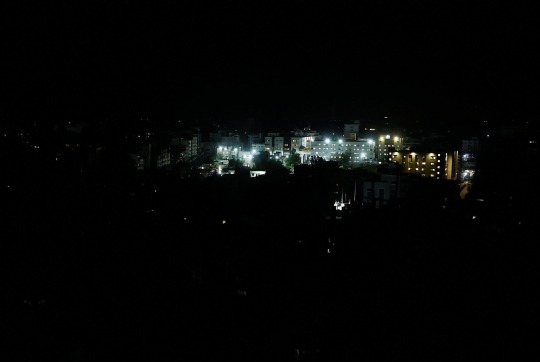
Palestinians have noticed. In the words of Dana El Kurd, a Palestinian American political scientist, “Palestinians have lost faith in the efficacy of nonviolent protest as well as the possible role of the international community.” Mohammed Deif, the commander of Hamas’s military wing, cited this disillusionment during last Saturday’s attack. “In light of the orgy of occupation and its denial of international laws and resolutions, and in light of American and Western support and international silence,” he declared, “we’ve decided to put an end to all this.”
Hamas — and no one else — bears the blame for its sadistic violence. But it can carry out such violence more easily, and with less backlash from ordinary Palestinians, because even many Palestinians who loathe the organization have lost hope that moral strategies can succeed. By treating Israel radically differently from how the United States treated South Africa in the 1980s, American politicians have made it harder for Palestinians to follow the A.N.C.’s ethical path. The Americans who claim to hate Hamas the most have empowered it again and again.
Israelis have just witnessed the greatest one-day loss of Jewish life since the Holocaust. For Palestinians, especially in Gaza, where Israel has now ordered more than one million people in the north to leave their homes, the days to come are likely to bring dislocation and death on a scale that should haunt the conscience of the world. Never in my lifetime have the prospects for justice and peace looked more remote. Yet the work of moral rebuilding must begin. In Israel-Palestine and around the world, pockets of Palestinians and Jews, aided by people of conscience of all backgrounds, must slowly construct networks of trust based on the simple principle that the lives of both Palestinians and Jews are precious and inextricably intertwined.
Israel desperately needs a genuinely Jewish and Palestinian political party, not because it can win power but because it can model a politics based on common liberal democratic values, not tribe. American Jews who rightly hate Hamas but know, in their bones, that Israel’s treatment of Palestinians is profoundly wrong must ask themselves a painful question: What nonviolent forms of Palestinian resistance to oppression will I support? More Palestinians and their supporters must express revulsion at the murder of innocent Israeli Jews and affirm that Palestinian liberation means living equally alongside them in safety and freedom.
From those reckonings, small, beloved communities can be born, and grow. And perhaps one day, when it finally becomes hideously clear that Hamas cannot free Palestinians by murdering children and Israel cannot subdue Gaza, even by razing it to the ground, those communities may become the germ of a mass movement for freedom that astonishes the world, as Black and white South Africans did decades ago. I’m confident I won’t live to see it. No gambler would stake a bet on it happening at all. But what’s the alternative, for those of us whose lives and histories are bound up with that small, ghastly, sacred place?
Like many others who care about the lives of both Palestinians and Jews, I have felt in recent days the greatest despair I have ever known. On Wednesday, a Palestinian friend sent me a note of consolation. She ended it with the words “only together.” Maybe that can be our motto.
#articles#definitely one of the best most extensive most personal most meaningful articles i've read this week#also addresses a LOT of uh. talking points recently
290 notes
·
View notes
Text
Update! A kind soul over on twitter let me know that there are pretty reliable AI art checkers online, that have been developed by people specialising in AI and machine learning!
An NYT article also talks about the pros and cons of a number of them.
I tested all the 3 free open access sites (Illuminarty, Optic AI or Not, Umm-Maybe) and only Illuminarty and Optic AI or Not gave consistent results on both art and photographs.
I'll put the links below so anyone can go and check for whichever art they want to (download the original images from tumblr posts, and upload them)
https://www.aiornot.com/#home
https://app.illuminarty.ai/
These are the results :

Optic flagged it as AI immediately.
But Illuminarty had very interesting aspect : when I uploaded the full image, AI probability was 10%. but, on cropping out the bottom of the image (jacket) the probability jumped to 73.9%
This is consistent with my original comment on the art here
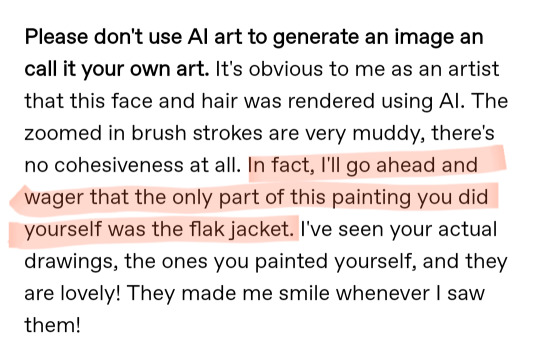
My limited understanding of these programs indicate that they scan the entire image including all the individual pixels. AI programs like Stable Diffusion, Mid Journey, DallE all leave signal artifacts when they process an image, which is then left on the final pic generated!
Compare these two @/skykashi original arts, that are immediately flagged as human made.

And now I get to my favourite AI art bro in the fandom @madasama! I commend you for admitting that you not only use AI, but are proud of producing a large number of "real" arts in such a short time!
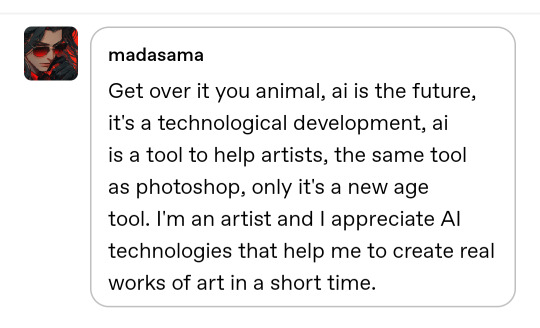
Here's your "art"s results!!


@elhnrt made a far more detailed and organised post about this specific weirdo, feel free to check it out!
I will be using fandom tags on this particular post so that it has a broader reach. Especially for genuine digital artists and art lovers. Save the links, and always keep an eye out for AI, it's everywhere these days.
#Naruto#Fanart#Digital art#Anti AI#say no to ai art#Fandom#Tumblr#AI resources#Idk if tumblr is gonna eat up this post on the tags#But it's worth a try#Also since I've been accused of trying to spread misinformation without 'solid proof'#Here's an attempt from verified widely used websites that anyone can access free of cost#The NYT article was a great resource#It talked about the pros and cons and limitations of each site#Worth a read tbh#These AI checkers are not 100% guaranteed to give accurate results all the time#It's best to check with multiple AI flaggers and compare results#And also with context clues like the artstyle skill set and frequency of posting arts of the acc in question
375 notes
·
View notes